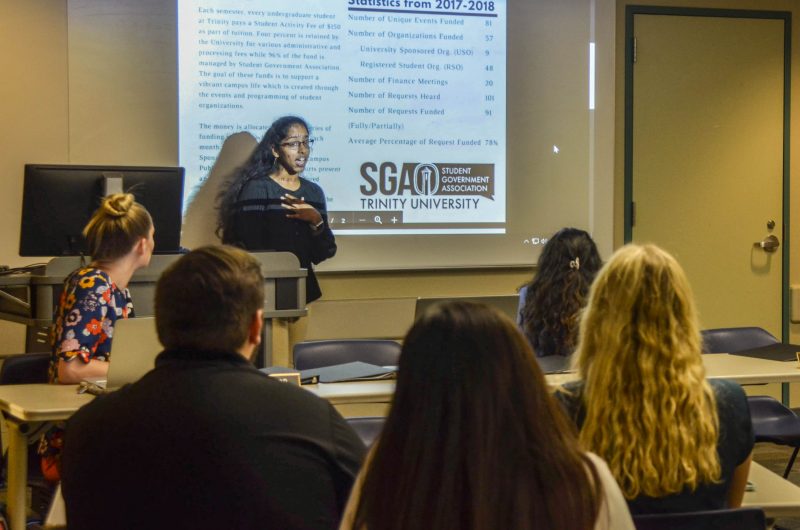When I first considered running for Student Government Association (SGA) last October, I must admit that I didn’t really understand what it was. I certainly was not aware of the fact that SGA manages nearly three-quarters of a million dollars every year.
$150 a semester, per student (that’s $1200 out of your pocket for your entire four-year stay at Trinity, by the way) is what makes up the Student Activity Fund (SAF). And who decides how to spend these funds? 15 college students with no formal financial training.
On the surface, this might not really seem like an issue. SGA senators are voted on by the student body, so theoretically, how SGA decides to spend their money should then be an extension of the student body’s desires — right?
Sadly, this is not the case. Voting turnout for SGA is next to nothing (fewer than one hundred of my peers voted me into office last November, and probably even fewer for classes of 2020 and 2019 senators), and although our meetings are always open to the public, it is extremely rare that we actually get student interest in what we’re doing. Students will spend all day complaining about how their meal plan dollars are spent at Mabee, but can’t take it upon themselves to attend meetings which decide how their SAF dollars are spent.
There are other issues besides apathy, however. SGA is simply designed to spend too much, which is what it has historically done. University Student Organizations (USOs) requested a 14 percent increase in funds this spring from the five-year average, and even though we were luckily able to trim a lot of the fat, this system of over-requesting takes funds away from Registered Student Organizations (RSOs). Part of the reason for this is three USOs — the Trinitonian, the Mirage and Recreational Sports — are all required to be funded at least their five-year average. Meaning, these groups can only increase their funding over time, never decrease.
Another issue is that SGA has gotten the reputation that we’ll “fund anything,” leading USOs and RSOs alike to ask for more than they actually need in hopes that we’ll give it to them. We try to cut every request that comes in front of us (which I think our current senate has done a very good job of, on the whole), but it’s difficult when student groups see us as a never-ending money pot, which we are not.
Luckily, these problems have solutions. Firstly, we need to rethink the five-year average rule and consider changing it to requiring SGA to only fund a percentage of the five-year average, instead of exceeding it. Also, giving a bigger role to our faculty advisers and adding an adviser with financial and accounting experience would be extremely helpful. We could allow this person — who understands finances and budgeting much more than 15 college students — veto power to be used when he or she feels that SGA is treading on a dangerous path. This would allow the students to still have a voice, but also be provided a safety net.
In addition, general education about SGA is necessary. Students at Trinity need to rethink how they see the SAF — it is not endless, and it should not be the first place you go to look for funds. Consider memberships dues, sponsorships and going to outside organizations before submitting a request to the senate. And (seriously!) go to SGA meetings. They might not be the most exciting way to spend your Wednesday evening (6 p.m. in the Waxahachie room), and if you can’t make it, the Trinitonian always publishes summaries.
The senators on SGA work hard to make the best financial decisions for Trinity students, which is not an easy job. I do not mean this article as any sort of indictment on our work because I am constantly amazed at how much everyone on SGA cares and wishes to make the most prudent decisions for our student body.
It is the structure of SGA itself that I take issue with and the simple fact that no one seems to care about the most powerful student group on campus. We’re the ones spending your money, after all. Get educated, talk to your senators and — most importantly — vote this November.






